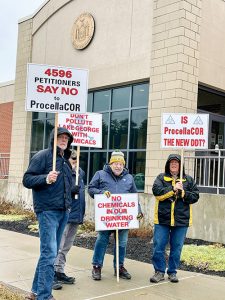By Mark Frost, Chronicle Editor
The Lake George Association and the Lake George Park Commission issued a press release Tuesday saying their fight over use of ProcellaCOR is over and they are “committed to collaboration.”
The LGA at the same time issued “initial results from ProcellaCOR monitoring” of the herbicide’s use in two bays June 29.
In Jelliffe-Knight Bay, the LGA said it found “complete killing” of Eurasian watermilfoil [EWM] in the treatment zone.
But in Blairs Bay, the LGA said while most EWM in the treatment zone died, “an area…along the northwest edge…appears to have been little affected.”

The LGA said, “Because of the water movement….dispersal of the herbicide was not uniform.” It also cited “the potential for milfoil fragments to drift and repopulate in the treatment area.”
The LGA said “ProcellaCOR broke down quickly” into “degradants” that “were measured in multiple sediment samples in both treatment and dilution zones.”
It said monitoring will continue.
LGA Chairman John Kelly and Lake George Park Commission Ken Parker spoke jointly with The Chronicle in a follow-up phone call Tuesday afternoon.
The Park Commission had issued an initial finding that the application of ProcellaCOR was very effective.
Do the LGA results agree with that?
Mr. Parker said the LGA’s result “pretty much lines up next to ours.”
Dr. Kelly said, “The data we’ve seen I think it agrees with the Park Commission.”
As to the “degradants” found in the sediment, Mr. Kelly called it “pretty much as expected, we found this degradant molecule in the soil. It’s a known byproduct of ProcellaCOR…It’s one of the things that we continue to watch very carefully and share that data with the Park Commission.”
Dr. Kelly said, “There’s no reports of it being toxic. It is an herbicide in and of itself, so we have to watch carefully that it doesn’t start to harm native plants or have any other side effects. But to my knowledge, and everything we’ve seen in the literature, there is no effect on, certainly not on humans or animals that I’m aware of.”
The Chronicle asked: If the Park Commission applies to use ProcellaCOR again, will the LGA again fight it?
“We’re keeping an open book on this to be honest,” Dr. Kelly said. “We want to collect this data. Let it speak for itself and work closely with our partner here in the Park Commission to examine it, discuss it, and then decide what’s best for the lake after that.”
Will the Park Commission advocate for use of ProcellaCOR again? “Bluntly, yes,” replied Mr. Parker, “but with advice and counsel from the LGA, utilizing their increased science, they have more science than we do…”
The Chronicle asked if the LGA’s litigation versus the Park Commission is over?
“It’s our plan to drop the ongoing litigation, the previous litigation, and we have no plans to litigate again,” said Dr Kelly.
The Chronicle asked, how did this ‘kumbaya moment’ come about? Who initiated it?
Mr. Parker replied, “It’s not very complicated, Mark. It’s just John came along, and with his common sense, he and I started talking a couple of weeks ago, and because we are both devoted to providing the best protection for Lake George, let’s ride the same set of rails and do everything together, which is what we used to and we’re just simply closing one door and reopening another.”
The Chronicle asked, The fierce public relations campaign that the LGA waged, do you regret that at all?
Dr. Kelly said, “I don’t want to be looking back. I’m a go forward guy. I think that it’s all about, what are we going to do next? And I am just really, really pleased that new information, a new day is emerging here, and we now have extremely open communication routinely.
“So I’m looking forward and I’m not looking back. There’s no benefit to, you know, going backwards.”
The Chronicle suggested that Dave Wick, the Park Commission’s executive director, was “really raked over the coals” in the LGA PR campaign, even accosted. We asked, “Is there any apology to him?”
Dr. Kelly did not comment, saying he wasn’t aware of what went on.
Mr. Parker said, “On that Mark, you’re right about certain parts of that.”
He said tensions were so strong, “One day I had myself escorted to my car after a court hearing” by a sheriff’s officer.
But Mr. Parker added, “The sense of responsibility has been taken. The record has been cleared. Dave Wick is as much on board as John Kelly and Ken Parker are, the Park Commission is totally committed to the project. Dave Wick has moved on, Ken Parker has moved on.”
Asked at the end of the interview if there was anything they wanted to add, Mr. Parker said, “I just look forward to hearing from both of us at the same time discussing things, working on septic, working on storm water, working on boat inspection, all of the things we’ve always worked on, and combining our abilities and the LGA abilities and combining our sciences and who wins? Lake George.”
Dr. Kelly said, “I couldn’t agree more. I would just say that Lake George and the community are so fortunate to have a dedicated state agency, the Park Commission, for Lake George. And to have the Lake George Association, the first, and I would argue, the strongest Lake association and certainly the most technically talented one in the country.
“And we’re just fortunate to have each of them, but having the two of us together is so important because, you know, one plus one is a lot more than two when we work together. And I look forward to that partnership with Ken and the Park Commission going forward.”
Copyright © 2024 Lone Oak Publishing Co., Inc. All Rights Reserved
 Glens Falls Chronicle Serving the Glens Falls/Lake George region; Warren, Washington and northern Saratoga counties since 1980
Glens Falls Chronicle Serving the Glens Falls/Lake George region; Warren, Washington and northern Saratoga counties since 1980


